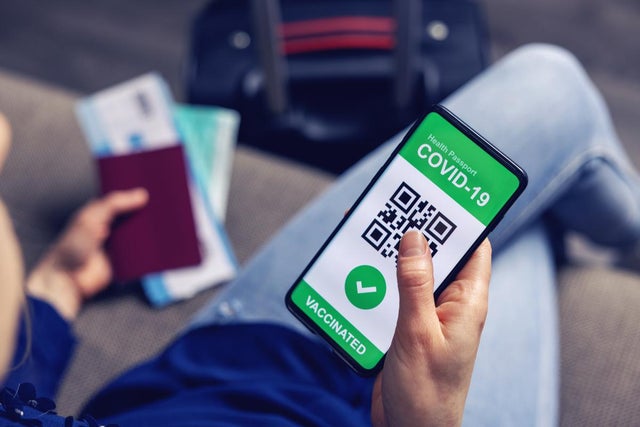By Ben Kerrigan-
The British government is to trial a series of measures in England, including Covid passports, to allow the safe return of sports matches, events and nightclubs.
Under the plans, passes would be used to show whether a person had been vaccinated, had a recent negative test, or natural immunity.
It is thought that the Covid -Status Certificates will be available both digitally on an app and on paper signed by a GP.
The passports will act as proof the holder has been vaccinated, has immunity from having previously had Covid or has tested negative.
Trial events in the coming months will also explore how ventilation and testing before and after could help crowds return.
University of Liverpool’s Prof Iain Buchan, who will be helping run the city’s trials, told BBC Breakfast taking part would involve giving consent when booking a ticket, receiving text messages about Covid safety, minimising your contacts before the event, and getting tested as close to the event as possible.
The sports minister said that any use of passes would be “time-limited”.
The pilots, which will include the FA Cup final, will last until mid-May, and some of the listed events will not be trialling vaccination certification, including those taking place in Liverpool.
Last week, opposition leader Keir Starmer said Covid passports are ant British, but prime minister Boris Johnson said the use of covid passports for international travel will be a way of life for the future.
Sports Minister Nigel Huddleston described the trials as a “learning experience”, saying no decisions had yet been made on processes or vaccination certificates.
He said the earlier pilots “almost certainly won’t involve any element of certification”, and that the government would also be looking at mitigations such as one-way systems and hygiene measures.
Mr Huddleston said the PM would receive a report on the trials at the end of May, and suggested further events could be added later in the year.
The plans comes as Michael Gove is due to publish a report on April 11 about the ethical and philosophical implications of Covid passports in the UK.
More than 31.5 million people have received a first dose of the vaccine, and nearly 5.4m have received both jabs, according to the latest government figures. All adults are due to be offered vaccination by the end of July, the government has said.
The pilots will include the FA Cup semi final and final in London’s Wembley Stadium, the World Snooker Championship in Sheffield, a mass participation run at Hatfield House in Hertfordshire, and several events in Liverpool including an evening at a nightclub, a business conference and a cinema screening in the city.
The first pilot event will be a comedy night in Liverpool on 16 April where audience members will be tested for Covid before and after the show.
The University of Liverpool’s Prof Iain Buchan, who will be helping run the city’s trials, told BBC Breakfast taking part would involve giving consent when booking a ticket, receiving text messages about Covid safety, minimising your contacts before the event, and getting tested as close to the event as possible.
Prof Buchan added that people who developed any symptoms and the events would be held in well-ventilated places.
After the event, people would be asked to minimise their contacts and get another test five days later, for the purposes of research, he said.
Critics, including more than 40 Tory MPs and privacy campaigners, have suggested a Covid passport scheme could be “discriminatory and counterproductive”.
Former Labour leader Jeremy Corbyn, who now sits as an independent, and senior Tory Iain Duncan Smith are among a broad coalition of MPs who have pledged their opposition.
Their concerns have been echoed by leading scientists, including infectious diseases expert Dr Mike Tildesley, who said he was “very much against the idea of domestic travel passports at the moment” when many people have not been offered the vaccine and uptake was inconsistent among communities.
Prof Melinda Mills, director of the Leverhulme Centre for Demographic Science at the University of Oxford, also appeared on the programme, and said there were “still a lot of open questions” about the scheme.
They included practical questions and ethical ones, she said, such as: “Do I have to pay for the testing if I haven’t been vaccinated or had that opportunity?”
The sociologist acknowledged the scheme could work as an incentive for people to get vaccinated, but added that it could also inspire forgery if paper documents are used.
While the proposed plans cover England only, the government is discussing the scheme with Scotland, Wales and Northern Ireland.
Under the government’s plan to ease England’s lockdown, legal limits on social contact could be lifted by 21 June, if strict conditions are met.
The government said its risk-based traffic-light system for international travel would “help ensure the UK’s vaccine progress isn’t jeopardised and provide clear guidance for travellers”.
After this point, travellers from countries in the green category will not have to isolate, although pre-departure and post-arrival tests will still be needed.
For countries assigned red and amber, restrictions would remain as they are now, with arrivals required to enter quarantine or self-isolation.
The list of countries included in each category will be drawn up closer to the time, and the government continues to advise people not to book summer holidays abroad.




